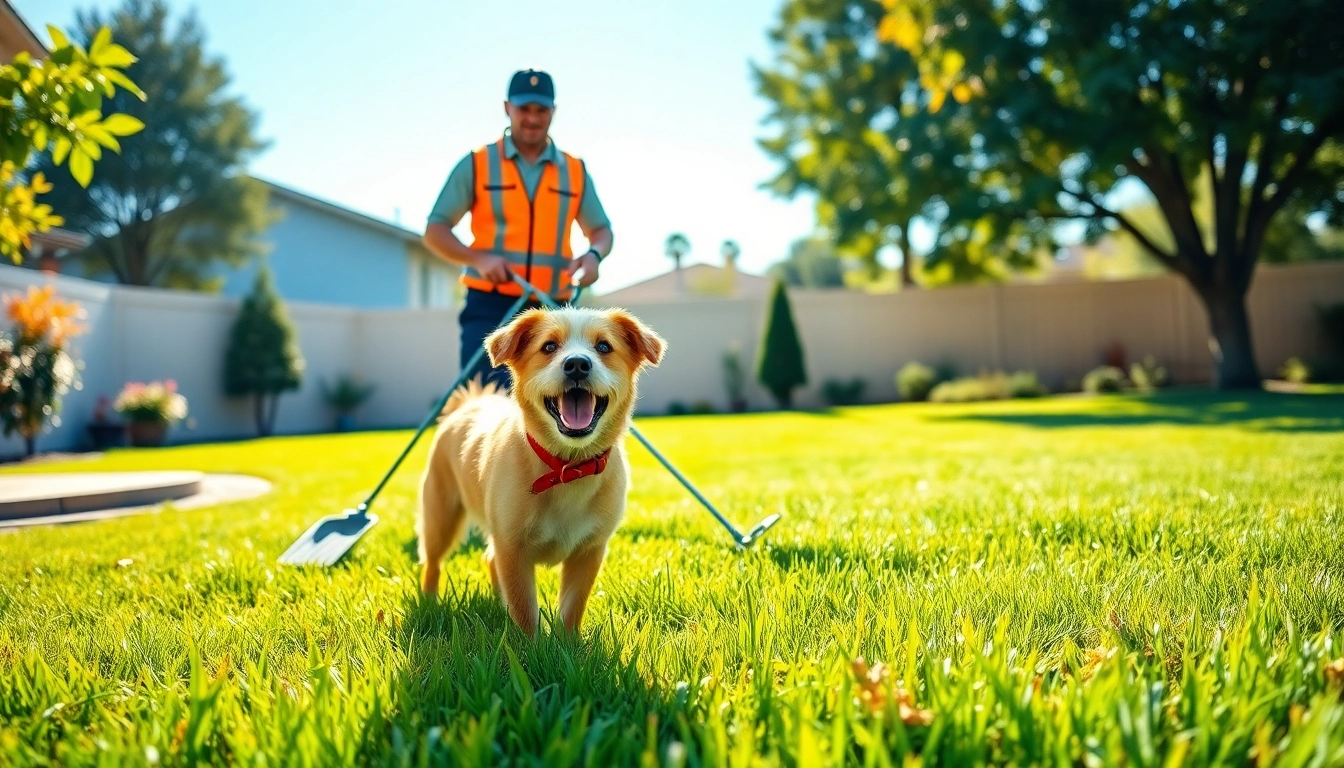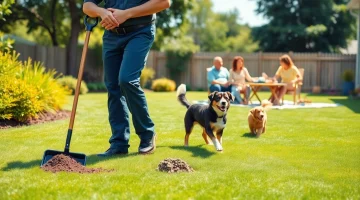
Expert Guide to Weekly Dog Poop Scooping: Keep Your Yard Clean and Fresh
Understanding Weekly Dog Poop Scooping
Keeping a backyard clean often comes down to regular maintenance, especially when you have pets. For dog owners, one of the most routine yet crucial tasks is weekly dog poop scooping. This essential service not only promotes a hygienic living environment but also enhances the overall experience of having a pet. Whether you are considering hiring a professional service or tackling the chore yourself, understanding the nuances can make all the difference.
What is Weekly Dog Poop Scooping?
Weekly dog poop scooping refers to the regular collection and disposal of dog waste in your yard. This service can be done by the pet owner or a hired professional. The main goal is to keep the area free from unpleasant smells and health hazards associated with dog feces.
For pet owners, this might seem like a routine task, but many find it tedious and time-consuming, particularly if they have multiple dogs or a large yard. As a result,
many turn to professional services that specialize in this kind of waste management, enabling them to enjoy their pets without the hassle.
Benefits of Regular Waste Removal
Regular waste removal offers numerous benefits that go beyond mere aesthetics. Here are some key advantages:
- Health Benefits: Dog poop contains harmful bacteria and parasites which can pose serious health risks to both pets and humans. Regular scooping minimizes the exposure and transmission of these pathogens.
- Pest Control: Accumulated dog waste can attract pests such as flies, rodents, and other nuisance animals. Keeping the area clean reduces pest populations.
- Better Outdoor Experience: A clean yard provides a more inviting space for outdoor activities and family gatherings, allowing you to enjoy your backyard without the worry of stepping in messes.
- Environmental Advantages: Proper waste disposal prevents contamination of soil and waterways, contributing to a healthier ecosystem.
Choosing the Right Service
When it comes to selecting a dog poop scooping service, numerous options exist, from local independent providers to national franchises. Here are some factors to consider:
- Service Frequency: Determine if you need a weekly, bi-weekly, or one-time service depending on your yard size and number of dogs.
- Reviews and Reputation: Seek out reviews and testimonials from previous clients to gauge the quality of service offered.
- Pricing: Compare pricing models among providers to understand what fits within your budget while ensuring quality service.
- Additional Services : Some companies may offer additional services, such as yard deodorizing or landscaping; consider these options based on your needs.
Factors Influencing Poop Scooping Costs
Understanding the various elements that contribute to the costs of a dog poop scooping service can empower pet owners to make informed decisions. Here are primary considerations:
Service Frequency and Pricing Models
Pricing models can vary widely among different providers. Most companies offer tiered pricing based on the frequency of service:
- Weekly Services: Generally the most economical option for pet owners, providing regular upkeep and management.
- Bi-Weekly or One-Time Services: Might cost more per visit; these services can accommodate those who may not need weekly pickups or find that their pet’s waste is manageable over a more extended period.
Size of Yard and Number of Pets
The size of your yard and the number of dogs significantly influence pricing. Larger yards, specifically those with dense grass or sandy areas, may require more time and effort from scooping professionals. Similarly, households with multiple dogs will yield more waste, potentially increasing servicing costs.
Additional Services Offered
Some companies provide additional services that may incur extra costs, such as:
- Deodorization: A service that neutralizes odors from pet waste.
- Yard Maintenance: Such as removal of leaves, lawn mowing, or maintenance for other outdoor spaces.
Step-by-Step Guide to DIY Dog Poop Cleanup
If you choose to handle poop scooping yourself, understanding the right tools and techniques can make the process more manageable. Here’s how to clean your yard efficiently:
Essential Tools for Effective Cleaning
Having the right tools makes a significant difference. Consider these essentials:
- Pooper Scooper: A handheld scooper or rake to pick up waste. Look for one that is ergonomically designed.
- Plastic Bags: Biodegradable bags or heavy-duty plastic will help contain the waste without damage.
- Gloves: Protect your hands while scooping to prevent coming into contact with waste.
- Disinfectant: If preferred, a dog-safe disinfectant can be used to clean any areas that may have been exposed.
Best Practices for Safe Waste Disposal
Follow these best practices to ensure responsible disposal of feces and keep your environment safe:
- Seal the Waste: Double-bag the waste for a more secure disposal. This will help reduce odors and prevent leakage.
- Choose the Right Disposal Method: Many communities have designated waste bins for animal waste, or consider composting options if permitted.
How to Maintain a Clean Yard
Maintenance is key! Here are some ways to keep your yard clean:
- Establish a Cleaning Schedule: Whether you scoot yourself or have a professional service, a routine will help prevent waste buildup.
- Train Your Dog: If possible, train your pet to relieve themselves in discreet areas of your yard.
Comparing Pooper Scooper Services
With numerous options available, comparing pet waste removal services can be challenging. To make the best choice:
Local vs. National Providers
Consider the pros and cons of each type of provider:
- Local Providers: Generally offer more personalized services and may be more flexible in terms of service customization.
- National Providers: Often have standardized practices, which ensure consistency but may lack flexibility in niche requests.
Service Reviews: What to Look For
Positive reviews can testify to service quality. Look for customer feedback on:
- Timeliness and reliability of service
- Professionalism and friendliness of staff
- Overall customer satisfaction levels
Questions to Ask Your Provider
Before hiring a scooping service, consider asking these questions:
- What specific services are included in the package?
- How often are cleanings performed?
- Are there any hidden fees?
- How do you handle inclement weather or scheduling conflicts?
Environmental Impact of Dog Waste
The management of pet waste is not just an aesthetic concern; it has significant implications for the environment. Understanding these impacts can help promote responsible pet ownership.
Why Proper Cleanup Matters
Improper disposal of dog waste contributes to environmental pollution. Fecal matter can run off into storm drains, contaminating local waterways and harming aquatic life. It is crucial to recognize the role pet owners play in environment stewardship.
Health Risks of Dog Waste in Yards
Dog waste has numerous health risks associated with it. Here are a few key points:
- Contains parasites like roundworms and hookworms, which can infect other animals and humans.
- Presents risks of bacterial infections like salmonella and E. coli, which can be dangerous, especially for children and immunocompromised individuals.
Eco-Friendly Waste Disposal Options
Consider eco-friendly disposal methods, which may include:
- Biodegradable Bags: Use eco-friendly bags for waste collection.
- Composting: If allowed, composting dog waste can turn it into nutrient-rich fertilizer.
Conclusion
Establishing a regular routine for weekly dog poop scooping is not just about maintaining the aesthetic appeal of your yard—it’s about contributing to the health and well-being of your family and the environment. By understanding the benefits, costs, and necessity of this practice, dog owners can create a cleaner, safer outdoor space for their pets and loved ones alike.



